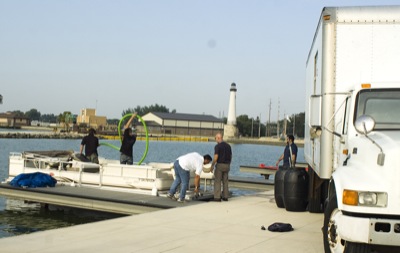Tuesday, August 31st, 2010
Silica study starts on Grand Lake
By Nancy Allen

Photo by Mark Pummell/The Daily Standard
Representatives from Algaeventure Systems, Marysville, made the first application of silica to a 2.5-acre test site in Grand Lake today. The test is to see if good, diatom algae can be made to grow and outcompete the lake's toxic blue-green algae. Three more applications of silica will be made this week and next, said company CEO Ross Youngs.
GRAND LAKE - Silica was applied to a 2.5-acre test area in Grand Lake this morning to see if good algae can be made to grow and out-compete the toxic blue-green algae.
Marysville-based Algaeventure Systems plans to make three more silica applications, one this week and two next. The application site is near the Celina Rotary lighthouse.
Ross Youngs, CEO of Algaeventure Systems, said the good algae - diatom - needs silica to grow and build its glass cell walls. He said the test could produce results as early as September or not at all.
"It ranges from seeing success early or results that guide us to change our decision making," Youngs said this morning. "We've seen success in the lab and when you go from the lab to a scaled environment you have to learn some things and that's what we're trying to do now."
Youngs said U.S. EPA officials will handle water analysis to determine if the test is successful. Algaeventure also is working with the city of Celina and Bowling Green State University, which recently did an experiment using silica to grow diatoms in the lake.
Youngs would not divulge how much silica was applied or the method of application, other than to say a boat was used. He said the method is the company's "intellectual property."
"We want to find potential solutions to the problems related to cyanobacteria blooms," Youngs said. "We believe a strategy to get diatoms growing is the best way to do that."
The toxic blue-green algae led the state to place an advisory on the lake in June telling people to avoid any and all contact with the water, including not taking boats on the lake or eating fish from it. Late last week the state downgraded the advisory to again allow boating after algae toxin levels fell considerably, most likely due to the cooler weather.
The silica pilot test is one of two possible short-term solutions proposed by the state to combat the algae blooms. The other test involves adding aluminum sulfate in a test area to neutralize phosphorous, the algae's food source. That test will take place later, according to state officials.

